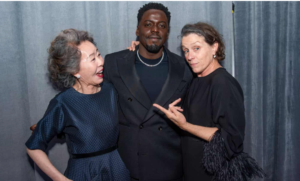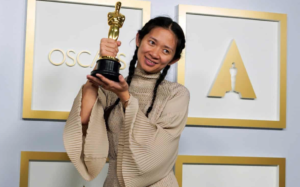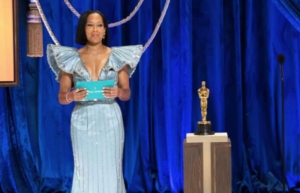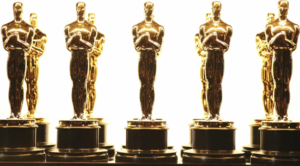 Chloé Zhao, Anthony Hopkins, Daniel Kaluuya … diversity has truly taken root at the Oscars – with women, older characters and people of colour being recognised. Even before the curtain fell, this year’ Oscars attracted a lot of labels. Oddest Oscars ever! That seemed fair: no hosts, no songs, just 170 guests clapping in a train station. Most sombre Oscars ever? Also true. A global pandemic and a lot of films inspired by police brutality don’t make for the frothiest few hours.
Chloé Zhao, Anthony Hopkins, Daniel Kaluuya … diversity has truly taken root at the Oscars – with women, older characters and people of colour being recognised. Even before the curtain fell, this year’ Oscars attracted a lot of labels. Oddest Oscars ever! That seemed fair: no hosts, no songs, just 170 guests clapping in a train station. Most sombre Oscars ever? Also true. A global pandemic and a lot of films inspired by police brutality don’t make for the frothiest few hours.
Most boring Oscars ever? That, too, has some validity: the meticulous stage-managing dictated by Covid protocols made for a remarkably smooth – and platitudinous – ceremony, with none of the slips that can help keep viewers from snoozing. And, of course, most diverse Oscars ever. This is the hardest to argue with. February 2019 – when tin-eared “anti-racism” buddy movie Green Book won the Oscar and Spike Lee headed for the exit in disgust – seems like a lifetime ago.
 Instead, half of the acting Oscars went to people of colour (Minari’s Young Yuh-jung, Judas and Black Messiah’s Daniel Kaluuva. Two of the five directing nominees were women (Nomadland’s Chloé Zhao, Emerald Fennell for Promising Young Woman); two were people of colour (Zhao and Lee Chang Isaac, who made Minari). Zhao, who was born in Beijing and moved to the US in her late teens, became the second woman and first woman of colour to win best director. Her film also picked up best picture: a pair of gongs it had won at almost every preceding awards ceremony.
Instead, half of the acting Oscars went to people of colour (Minari’s Young Yuh-jung, Judas and Black Messiah’s Daniel Kaluuva. Two of the five directing nominees were women (Nomadland’s Chloé Zhao, Emerald Fennell for Promising Young Woman); two were people of colour (Zhao and Lee Chang Isaac, who made Minari). Zhao, who was born in Beijing and moved to the US in her late teens, became the second woman and first woman of colour to win best director. Her film also picked up best picture: a pair of gongs it had won at almost every preceding awards ceremony.
Yet Nomadland, an elegiac drama about people living in their vans in America’s midwest, is not at first glance an especially diverse film. Its writer/director may be Asian, but every single cast member is white. They all appear to be heterosexual. But its radicalism hides in plain sight. Nomadland is, after all, the first best picture winner ever to be totally focused on women. Women who happen to all be firmly over 60. For 93 years, male ensemble movies have been the meat and potatoes of best picture fare. Even when Kathryn Bigelow won best director and picture in 2010 it was for a testosterone-heavy war thriller. But this year, The Trial of the Chicago 7 – men endlessly yelling in a courtroom – not only failed to scoop the big prize, it failed to win any awards at all
For all that it actually follows Oscars formula, then, Nomadland might as well have been made on the moon. It is absolutely unapologetic about its lack of interest in rote, gendered plot points. Its politics may be soft-centred – all the trailer park residents encountered by Fern, Frances McDormand’s impoverished widow, are benevolent, and everyone seems to actively prefer living in a van to a house – yet its portrait of women in their third act is clear-eyed and unsentimental. We watch Fern sweat as she cleans public toilets, grapples with her own van’s lack of one and strip off for a solo swim, basking in a lake, unplucked, unwaxed and absolutely happy.
McDormand’s real-life nomad co-stars, Linda May and Charlene Swankie, are similarly unvarnished. Both have self-shorn grey hair; Swankie’s sling might be as much statement as necessity. Such salon-scepticism comes as contrast to those ageing broads who have sometimes popped up in best picture winners. Generally speaking these women come highly coiffured (Terms of Endearment, All About Eve) or strikingly isolated (Driving Miss Daisy). Certainly, it’s hard to imagine Shirley MacLaine giving herself a buzzcut or relieving herself in a bucket.
Nomadland does feature one man, played by the actor David Strathairn. But he’s disposable. Despite a whisper of attraction between his character and McDormand’s, nothing is spoken, and the film passes without any conventional love scene.
 But Nomadland’s other big victory – best actress for McDormand – has also been flagged by some as a chink in the inclusivity credentials of this year’s Oscars (of the four actors she beat, two – Viola Davis and Andra Day – are black).
But Nomadland’s other big victory – best actress for McDormand – has also been flagged by some as a chink in the inclusivity credentials of this year’s Oscars (of the four actors she beat, two – Viola Davis and Andra Day – are black).
There’s a similar story when it comes to Anthony Hopkins’s best actor win for The Father. Not only is he, like McDormand, an old stager (she has won twice before; he’s won once and been nominated seven times) he also beat multiple actors of colour, including the frontrunner, the late Chadwick Boseman.
Yet despite their whiteness, both these wins do also tell their own encouraging story. At 83, Hopkins is the oldest ever acting winner. McDormand, 63, is the oldest best actress winner since Jessica Tandy in 1989.
Chloé Zhao, Anthony Hopkins, Daniel Kaluuya … diversity has truly taken root at the Oscars – with women, older characters and people of colour being recognised
Even before the curtain fell, this year’ Oscars attracted a lot of labels. Oddest Oscars ever! That seemed fair: no hosts, no songs, just 170 guests clapping in a train station. Most sombre Oscars ever? Also true. A global pandemic and a lot of films inspired by police brutality don’t make for the frothiest few hours.
Most boring Oscars ever? That, too, has some validity: the meticulous stage-managing dictated by Covid protocols made for a remarkably smooth – and platitudinous – ceremony, with none of the slips that can help keep viewers from snoozing.
And, of course, most diverse Oscars ever. This is the hardest to argue with. February 2019 – when tin-eared “anti-racism” buddy movie Green Book won the Oscar and Spike Lee headed for the exit in disgust – seems like a lifetime ago.
Instead, half of the acting Oscars went to people of colour (Minari’s Young Yuh-jung, Judas and Black Messiah’s Daniel Kaluuva. Two of the five directing nominees were women (Nomadland’s Chloé Zhao, Emerald Fennell for Promising Young Woman); two were people of colour (Zhao and Lee Chang Isaac, who made Minari). Zhao, who was born in Beijing and moved to the US in her late teens, became the second woman and first woman of colour to win best director. Her film also picked up best picture: a pair of gongs it had won at almost every preceding awards ceremony.
Yet Nomadland, an elegiac drama about people living in their vans in America’s midwest, is not at first glance an especially diverse film. Its writer/director may be Asian, but every single cast member is white. They all appear to be heterosexual. But its radicalism hides in plain sight. Nomadland is, after all, the first best picture winner ever to be totally focused on women. Women who happen to all be firmly over 60. For 93 years, male ensemble movies have been the meat and potatoes of best picture fare. Even when Kathryn Bigelow won best director and picture in 2010 it was for a testosterone-heavy war thriller. But this year, The Trial of the Chicago 7 – men endlessly yelling in a courtroom – not only failed to scoop the big prize, it failed to win any awards at all
For all that it actually follows Oscars formula, then, Nomadland might as well have been made on the moon. It is absolutely unapologetic about its lack of interest in rote, gendered plot points. Its politics may be soft-centred – all the trailer park residents encountered by Fern, Frances McDormand’s impoverished widow, are benevolent, and everyone seems to actively prefer living in a van to a house – yet its portrait of women in their third act is clear-eyed and unsentimental. We watch Fern sweat as she cleans public toilets, grapples with her own van’s lack of one and strip off for a solo swim, basking in a lake, unplucked, unwaxed and absolutely happy.
McDormand’s real-life nomad co-stars, Linda May and Charlene Swankie, are similarly unvarnished. Both have self-shorn grey hair; Swankie’s sling might be as much statement as necessity. Such salon-scepticism comes as contrast to those ageing broads who have sometimes popped up in best picture winners. Generally speaking these women come highly coiffured (Terms of Endearment, All About Eve) or strikingly isolated (Driving Miss Daisy). Certainly, it’s hard to imagine Shirley MacLaine giving herself a buzzcut or relieving herself in a bucket.
Nomadland does feature one man, played by the actor David Strathairn. But he’s disposable. Despite a whisper of attraction between his character and McDormand’s, nothing is spoken, and the film passes without any conventional love scene.
But Nomadland’s other big victory – best actress for McDormand – has also been flagged by some as a chink in the inclusivity credentials of this year’s Oscars (of the four actors she beat, two – Viola Davis and Andra Day – are black).
There’s a similar story when it comes to Anthony Hopkins’s best actor win for The Father. Not only is he, like McDormand, an old stager (she has won twice before; he’s won once and been nominated seven times) he also beat multiple actors of colour, including the frontrunner, the late Chadwick Boseman.
Yet despite their whiteness, both these wins do also tell their own encouraging story. At 83, Hopkins is the oldest ever acting winner. McDormand, 63, is the oldest best actress winner since Jessica Tandy in 1989.
 Oscars 2021 winners: the full list:
Oscars 2021 winners: the full list:
From Nomadland to Ma Rainey’s Black Bottom, all the winners at the 93rd Academy Awards, as they are announced:
Best picture
The Father
Judas and the Black Messiah
Mank
Minari
Nomadland – WINNER
Promising Young Woman
Sound of Metal
The Trial of the Chicago 7
Best actress in a leading role
Viola Davis, Ma Rainey’s Black Bottom
Andra Day, The United States vs Billie Holiday
Vanessa Kirby, Pieces of a Woman
Frances McDormand, Nomadland – WINNER
Carey Mulligan, Promising Young Woman
Best actor in a leading role
Riz Ahmed, Sound of Metal
Chadwick Boseman, Ma Rainey’s Black Bottom
Anthony Hopkins, The Father – WINNER
Gary Oldman, Mank
Steven Yeun, Minari
Best original screenplay
Judas and the Black Messiah
Minari
Promising Young Woman– WINNER
Sound of Metal
The Trial of the Chicago 7
Best adapted screenplay
Borat Subsequent Moviefilm
The Father – WINNER
Nomadland
One Night in Miami
The White Tiger
Best international feature film
Another Round– WINNER
Better Days
Collective
The Man Who Sold His Skin
Quo Vadis, Aida?
Best actor in a supporting role
Sacha Baron Cohen, The Trial of the Chicago 7
Daniel Kaluuya, Judas and the Black Messiah– WINNER
Leslie Odom, Jr, One Night in Miami
Paul Raci, Sound of Metal
Lakeith Stanfield, Judas and the Black Messiah
Best makeup and hairstyling
Emma
Hillbilly Elegy
Ma Rainey’s Black Bottom – WINNER
Mank
Pinocchio
Best costume design
Emma
Mank
Ma Rainey’s Black Bottom– WINNER
Mulan
Pinocchio
Jean Hersholt humanitarian award
MPTF (Motion Picture & Television Fund)
Best director
Thomas Vinterberg, Another Round
Emerald Fennell, Promising Young Woman
David Fincher, Mank
Lee Isaac Chung, Minari
Chloé Zhao, Nomadland– WINNER
Best sound
Greyhound
Mank
News of the World
Sound of Metal – WINNER
Soul
Best live-action short film
Feeling Through
The Letter Room
The Present
Two Distant Strangers– WINNER
White Eye
Best animated short film
Burrow
Genius Loci
If Anything Happens I Love You – WINNER
Opera
Yes-People
Best animated feature film
Onward
Over the Moon
A Shaun the Sheep Movie: Farmageddon
Soul– WINNER
Wolfwalkers
Best documentary short
Colette – WINNER
A Concerto Is a Conversation
Do Not Split
Hunger Ward
A Love Song for Latasha
Best documentary
Collective
Crip Camp
The Mole Agent
My Octopus Teacher – WINNER
Time
Best visual effects
Love and Monsters
The Midnight Sky
Mulan
The One and Only Ivan
Tenet– WINNER
Best actress in a supporting role
Maria Bakalova, Borat Subsequent Moviefilm
Glenn Close, Hillbilly Elegy
Olivia Colman, The Father
Amanda Seyfried, Mank
Youn Yuh-Jung, Minary– WINNER
Best production design
The Father
Ma Rainey’s Black Bottom
Mank– WINNER
News of the World
Tenet
Best cinematography
Judas and the Black Messiah
Mank – WINNER
News of the World
Nomadland
The Trial of the Chicago 7
Best film editing
The Father
Nomadland
Promising Young Woman
Sound of Metal – WINNER
The Trial of the Chicago 7
Jean Hersholt humanitarian award
Tyler Perry
Best original score
Da 5 Bloods
Mank
Minari
News of the World
Soul – WINNER
Best original song
Husavik, Eurovision Song Contest: The Story of Fire Saga
Fight For You, Judas and the Black Messiah – WINNER
Io Sì (Seen), The Life Ahead
Speak Now, One Night in Miami
Hear My Voice, The Trial of the Chicago
………………………………………………….
Author : Eleanor Belson
